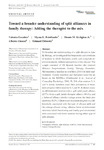Toward a Broader Understanding of Split Alliances in Family Therapy: Adding the Therapist to the Mix

Use este enlace para citar
http://hdl.handle.net/2183/31023
Excepto si se señala otra cosa, la licencia del ítem se describe como Atribución-NoComercial-SinDerivadas 4.0 Internacional
Colecciones
- Investigación (FEP) [507]
Metadatos
Mostrar el registro completo del ítemTítulo
Toward a Broader Understanding of Split Alliances in Family Therapy: Adding the Therapist to the MixFecha
2022-03Cita bibliográfica
Escudero, V., Friedlander, M. L., Kivlighan, D. M., Abascal, A., & Orlowski, E. (2022). Toward a broader understanding of split alliances in family therapy: Adding the therapist to the mix. Family Process, 61, 167– 182. https://doi.org/10.1111/famp.12718
Resumen
[Abstract] To broaden our understanding of a split alliance in fam-ily therapy, we investigated the frequencies and correlates of sessions in which therapists, youth, and caregivers re-ported markedly different perceptions of the alliance. The sample consisted of 156 Spanish families who received Alliance Empowerment Family Therapy (Escudero, Adolescentes y familias en conf licto, 2013) for child mal-treatment. Family members and therapists rated the al-liance on the SOFTA-s (Friedlander et al., Journal of Counseling Psychology, 2006, 53, 214) after sessions 3, 6, and 9; family members rated their perceptions of treat-ment progress before sessions 4, 7, and 10. A cluster analy-sis differentiated sessions with a split adult- youth alliance(27.7%) from a split family- therapist alliance (44.1%), and a balanced alliance (similar ratings across the three per-spectives; 28.2%). Client- rated treatment progress was dif-ferentially associated with the type of alliance split and the average alliance rating, whereas better posttreatment outcomes (child functioning and family goal attainment) were associated with fewer sessions having either type of split alliance
Palabras clave
Therapeutic alliance
Split alliance
SOFTA
Child maltreatment
Family Therapy Process
Alianza terapéutica
Alianza dividida
Maltrato infantil
Terapia de familia
Split alliance
SOFTA
Child maltreatment
Family Therapy Process
Alianza terapéutica
Alianza dividida
Maltrato infantil
Terapia de familia
Descripción
Financiado para publicación en acceso aberto: Universidade da Coruña/CISUG
Versión del editor
Derechos
Atribución-NoComercial-SinDerivadas 4.0 Internacional






